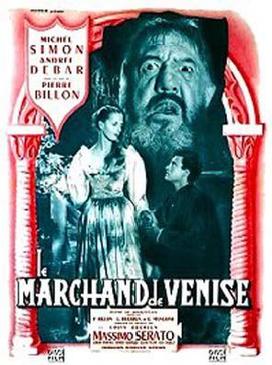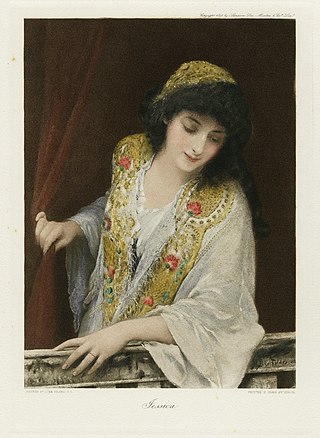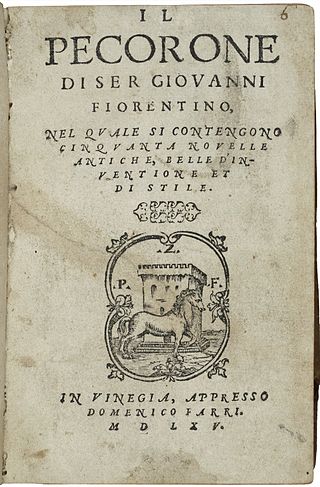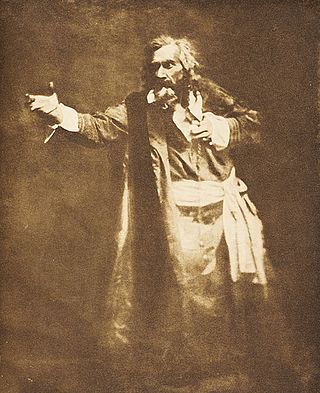
The Merchant of Venice is a play by William Shakespeare, believed to have been written between 1596 and 1598. A merchant in Venice named Antonio defaults on a large loan taken out on behalf of his dear friend, Bassanio, and provided by a Jewish moneylender, Shylock, with seemingly inevitable fatal consequences.

The Merchant of Venice is a 2004 romantic drama film based on Shakespeare's play of the same name. It is the first full-length sound film in English of Shakespeare's play—other versions are videotaped productions which were made for television, including John Sichel's 1973 version and Jack Gold's 1980 BBC production.

Portia is a female protagonist in The Merchant of Venice by William Shakespeare. In creating her character, Shakespeare drew from the historical figure of Porcia — the daughter of Cato the Younger — as well as several parts of the Bible.

Antonio is one of the central characters in William Shakespeare's play The Merchant of Venice. He is portrayed as a wealthy and respected merchant residing in Venice, known for his generosity and melancholic disposition. Antonio is a close friend of Bassanio, another important character in the play, and their bond serves as a crucial element of the story.
The Maori Merchant of Venice is a 2002 New Zealand drama film in the Māori language, directed by Don Selwyn.

The Merchant of Venice is a 1969 drama short film directed by Orson Welles based on William Shakespeare's play of the same name. While actually completed, it is frequently cited as an unfinished film, though better described as a partially lost film due to the loss of film elements.
The Merchant of Venice is a 1916 British silent drama film directed by Walter West and starring Matheson Lang, Hutin Britton, Ernest Caselli. It is an adaptation of William Shakespeare's play The Merchant of Venice.

The Merchant of Venice is a 1923 German silent drama film directed by Peter Paul Felner and starring Werner Krauss, Henny Porten and Harry Liedtke. The film is an adaptation of William Shakespeare's play The Merchant of Venice. It was released in the United States in 1926 as The Jew of Mestri. The film was made on location in Venice, with scenes and characters added which were not in the original play. This is the surviving copy, being two reels shorter than the German version. The characters in the German retained Shakespeare's nomenclature, but in the American they were given new names sourced from the Italian work Il Pecorone, a 14th-century short story collection attributed to Giovanni Fiorentino, from which Shakespeare is believed to have drawn his idea. The film purports to be a return to the original, as an excuse for its differences from the play.
"The quality of mercy" is a speech given by Portia in William Shakespeare's The Merchant of Venice. In the speech, Portia, disguised as a lawyer, begs Shylock to show mercy to Antonio. The speech extols the power of mercy, "an attribute to God Himself".

The Merchant of Venice is a 1953 French-Italian drama film directed by Pierre Billon and starring Michel Simon, Andrée Debar and Massimo Serato. It is loosely based on William Shakespeare's Elizabethan play of the same name.

Shylock is a fictional character in William Shakespeare's play The Merchant of Venice. A Venetian Jewish moneylender, Shylock is the play's principal villain. His defeat and conversion to Christianity form the climax of the story.

The Merchant of Venice is an opera by André Tchaikowsky (1935–1982) to a libretto, based on the Shakespeare play, by John O'Brien. Written between 1968 and 1982, it was first performed in 2013 at the Bregenz Festival. The British premiere was presented by the Welsh National Opera in September 2016.

Shylock is a 1940 Indian Tamil-language film directed by Kinema Ramu and Serukalathur Sama and produced by Bharat Pictures. It is based on William Shakespeare's play The Merchant of Venice, and features Sama as the title character. The film was released on 23 November 1940 and failed commercially. No print of it is known to survive, making it a lost film.
The Merchant of Venice is a lost 1914 American silent film historical drama based on William Shakespeare's play. It was directed by and starred Phillips Smalley and Lois Weber, a husband and wife directing team. It was produced and distributed by Universal Film Manufacturing Company.

The Merchant of Venice is a 1961 Australian television adaptation of the play by William Shakespeare that aired on 13 September 1961 in Sydney, and on 25 October 1961 in Melbourne.

Jessica is the daughter of Shylock, a Jewish moneylender, in William Shakespeare's The Merchant of Venice. In the play, she elopes with Lorenzo, a penniless Christian, and a chest of her father's money, eventually ending up in Portia and Bassanio's household. In the play's dramatic structure, Jessica is a minor but pivotal role. Her actions motivate Shylock's vengeful insistence on his "pound of flesh" from Antonio; her relationships with Lorenzo and Shylock serve as a mirror and contrast to Portia's with Bassanio and with her father; her conversion to Christianity is the end of Shylock's line's adherence to the Jewish faith.

Il Pecorone, often referred to in English as The Golden Eagle, is an Italian novella written between 1378 and 1385 by Giovanni Fiorentino. It was written in a style influenced by the Decameron of Giovanni Boccaccio, the Golden Legend collection of saint lives, the Seven Sages of Rome or the Gemma ecclesiastica of Giraldus Cambrensis. For its historical facts, however, it relies on the Nuova Cronica of Giovanni Villani.

The Merchant is a 1976 play in two acts by the English dramatist Arnold Wesker. It is based on William Shakespeare's The Merchant of Venice, and focuses on the Jewish Shylock character, that play's principal antagonist.

The Shylock Suite, Op. 57 is a six-movement work by Gabriel Fauré, first performed in 1890. In addition to four purely orchestral movements it includes two serenades for solo tenor with orchestral accompaniment. The composer constructed the suite from incidental music he had written the previous year for Edmond Haraucourt's play Shylock, an adaptation of Shakespeare's The Merchant of Venice, presented at the Théâtre de l'Odéon in Paris. The theatre music had been written for a small orchestra, and Fauré greatly expanded the orchestration for the concert suite.















